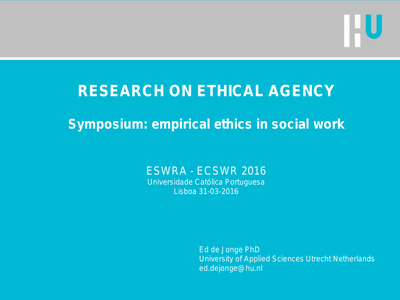Symposium ESWRA - ECSWR 2016: empirical ethics in social work. Objective: ethical aspects of social work (esp. at home) Structure: cooperation of the research group of UAS Utrecht Netherlands with six regional welfare organizations Method: practice based ethics research Focus on professional practice: learning from moral experiences in frontline practice (cf. Van Doorn, 2008) Hybrid approach: combining theoretical resources and professional practice (cf. Banks & Gallagher, 2009) Mixed methods: desk research, interviews, best practice units (BPU), development of ethical tools
DOCUMENT

The formation of acrylamide in potato crisps was fitted by empirical mathematical models. Potato slices were fried under the same experimental conditions for different times. Besides the content of precursors in the raw potato slices, acrylamide and water content in the potato crisps were quantified after predetermined times (2-6 min). The temperature developments in the surrounding oil and outer cell layer of the potato slices were monitored, giving more insight in the frying process and making future comparisons between studies possible. The pattern found for the formation of acrylamide, which was similar to earlier studies, was fitted to three empirical models. Statistical methods were used to compare the performance of the models, with the "Logistic-Exponential" and "Empirical" model performing equally well. The obtained model parameters were in the range of earlier reported studies, although this comparison is not unequivocal as the experimental conditions differed between studies. The precision of parameter estimates was problematic; this should be improved by better experimental design. Nevertheless, the approach of this study will make it possible to truly compare acrylamide formation patterns and model parameters in the future, with the ability to develop a tool to predict acrylamide formation in potato crisps.
DOCUMENT
This paper aims to offer a critical reflection on the way Talent Management (TM) is investigated in practice, by addressing the key issues regarding the quality (in terms of rigor and relevance) of academic empirical TM research and therefore the critical scrutiny of TM scholars’ work. We will argue that despite the growth in the quantity, the quality of many empirical TM papers is lagging behind and hindering the progress of the academic field of TM.
DOCUMENT
